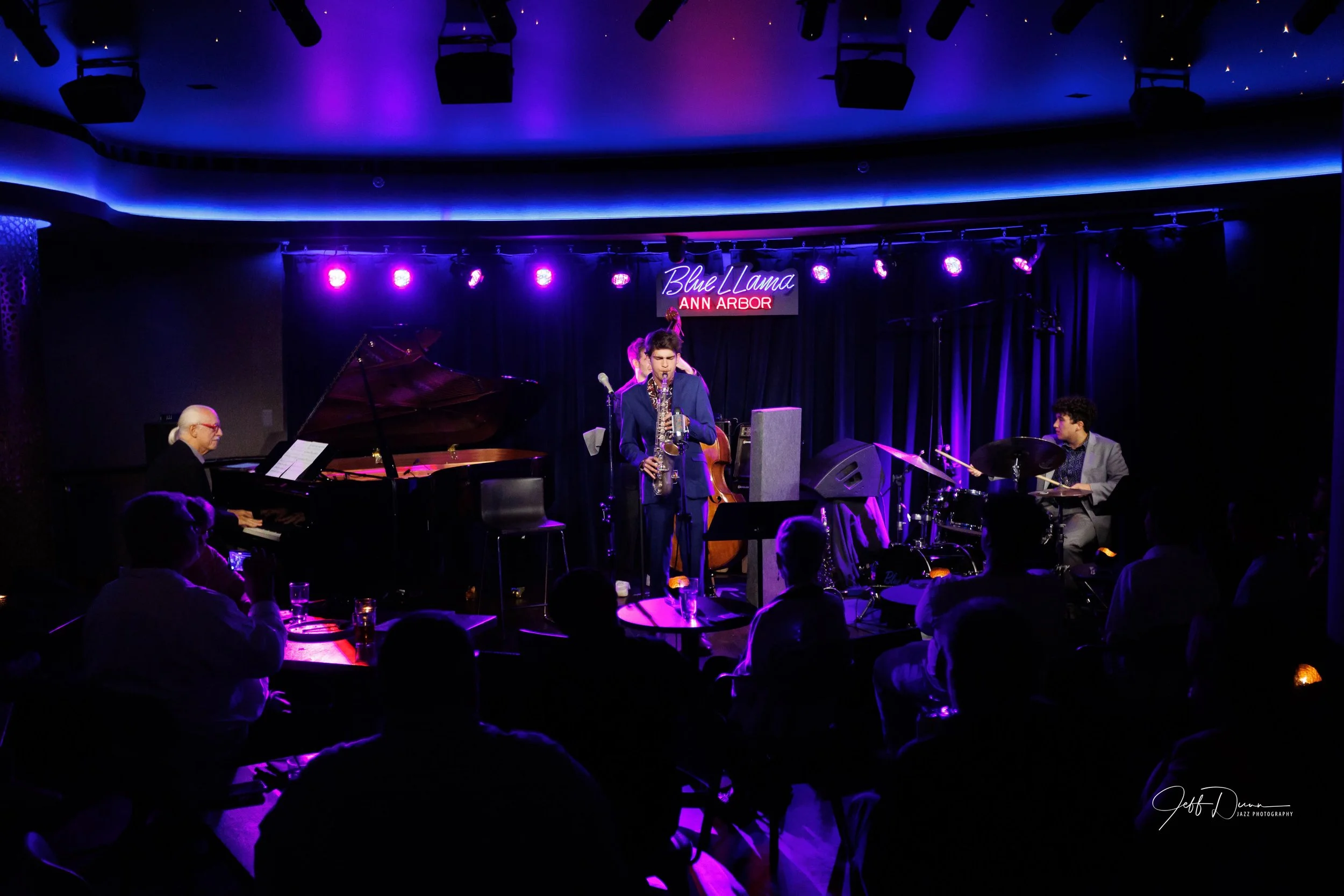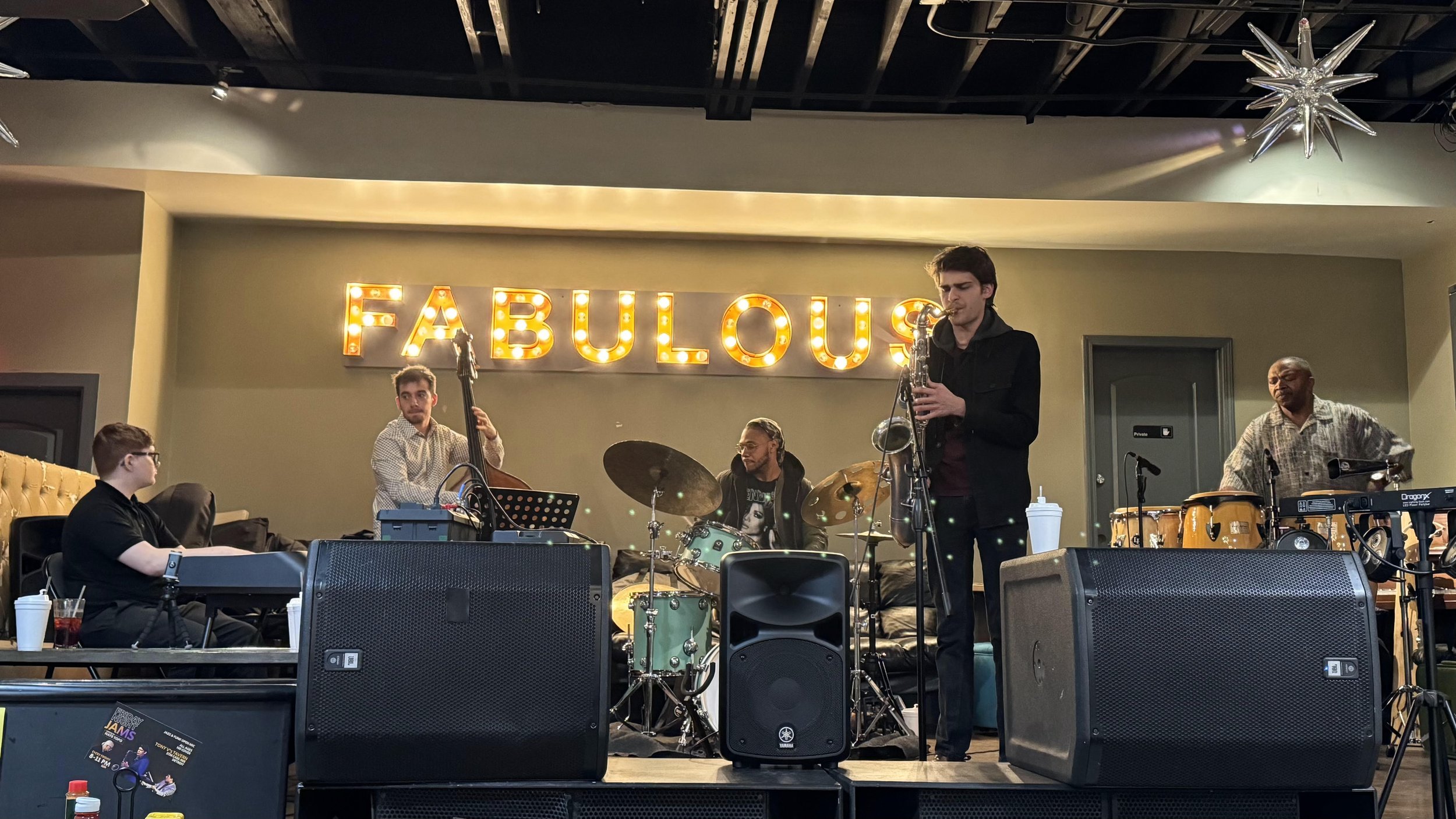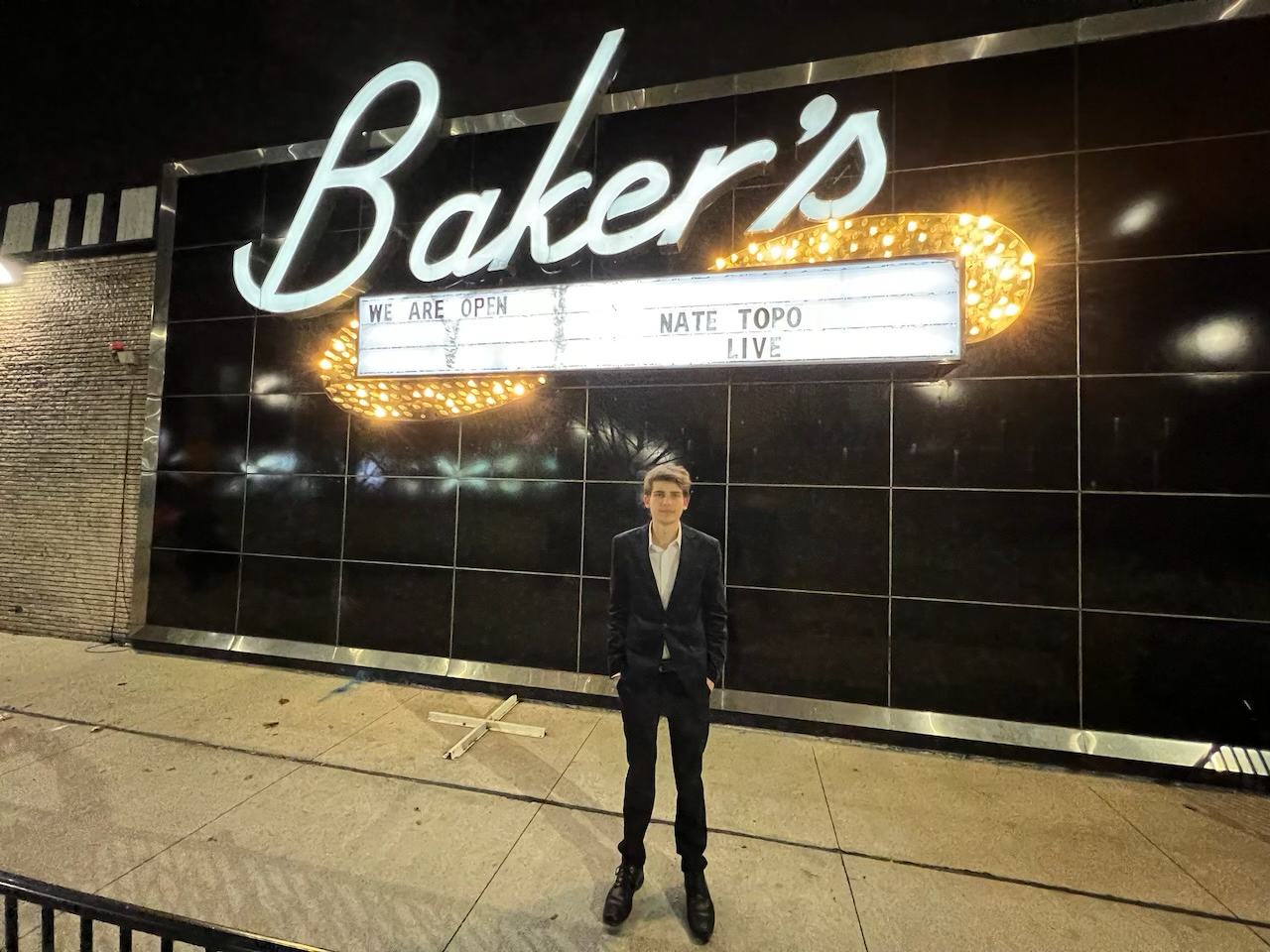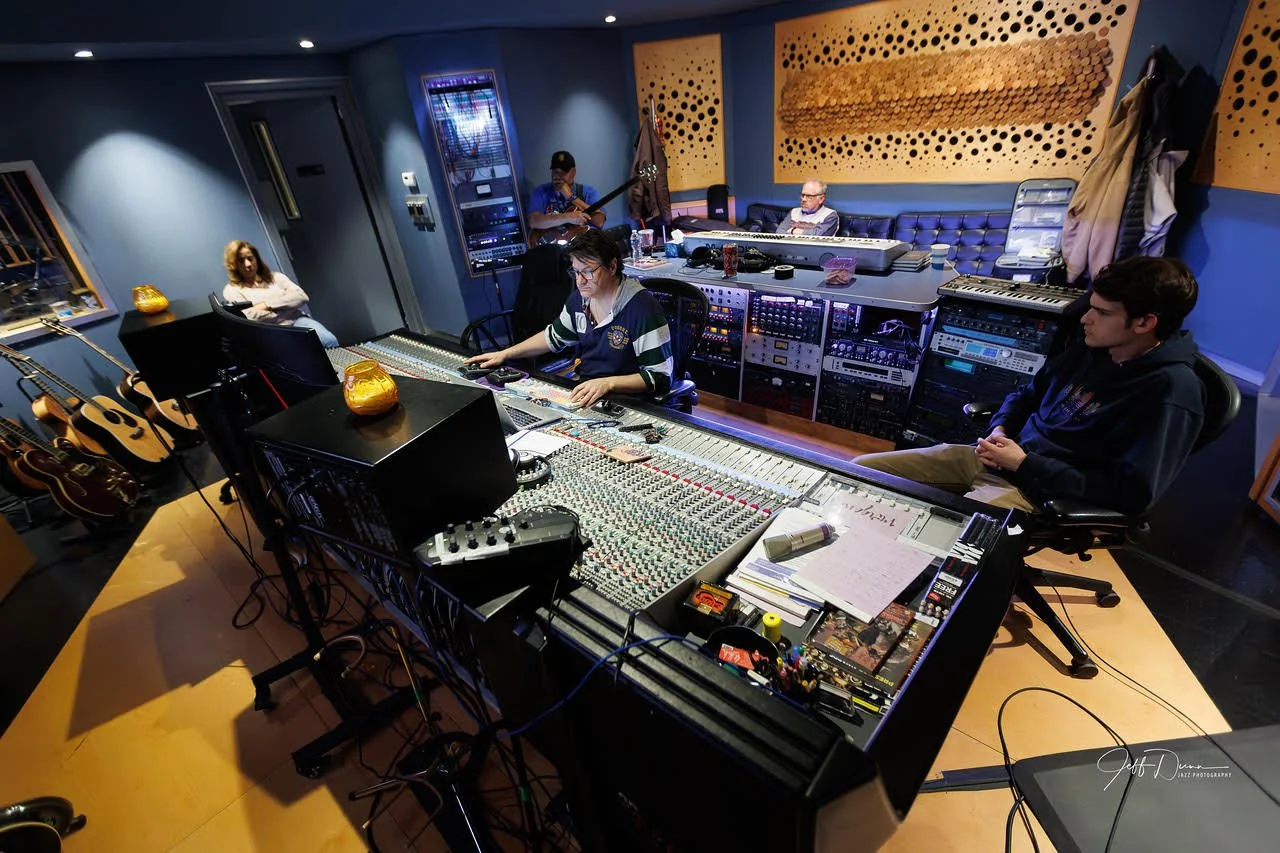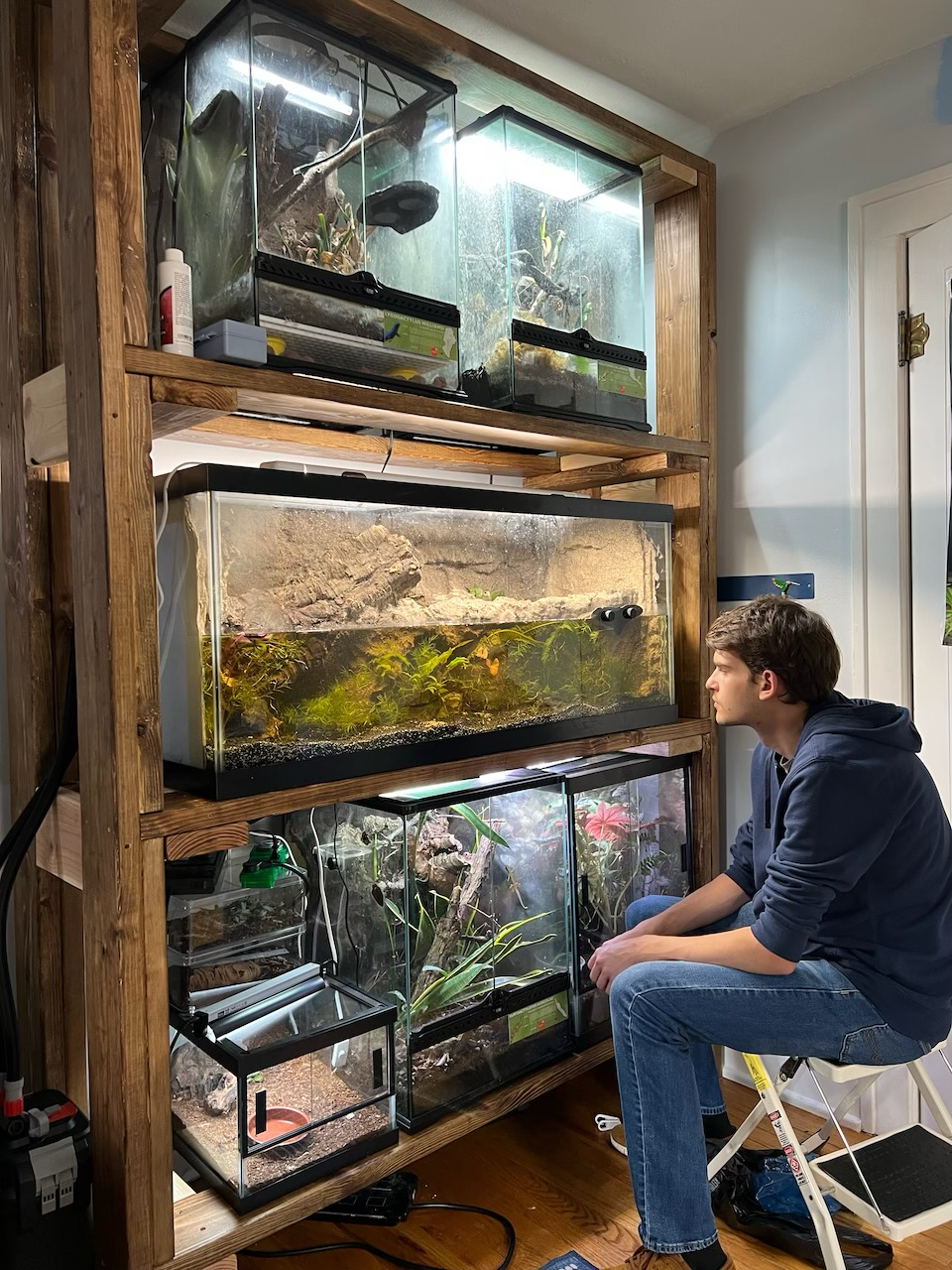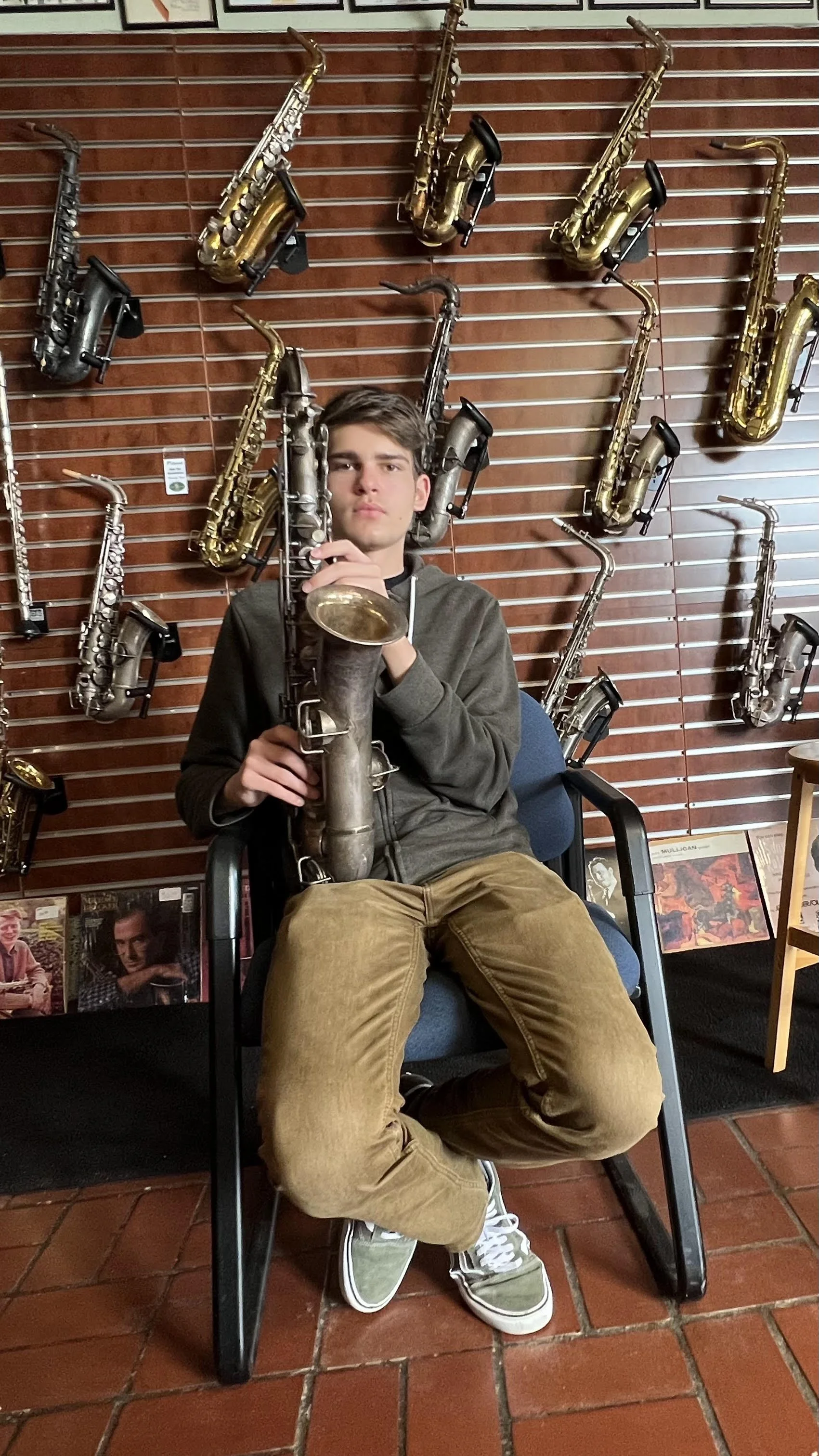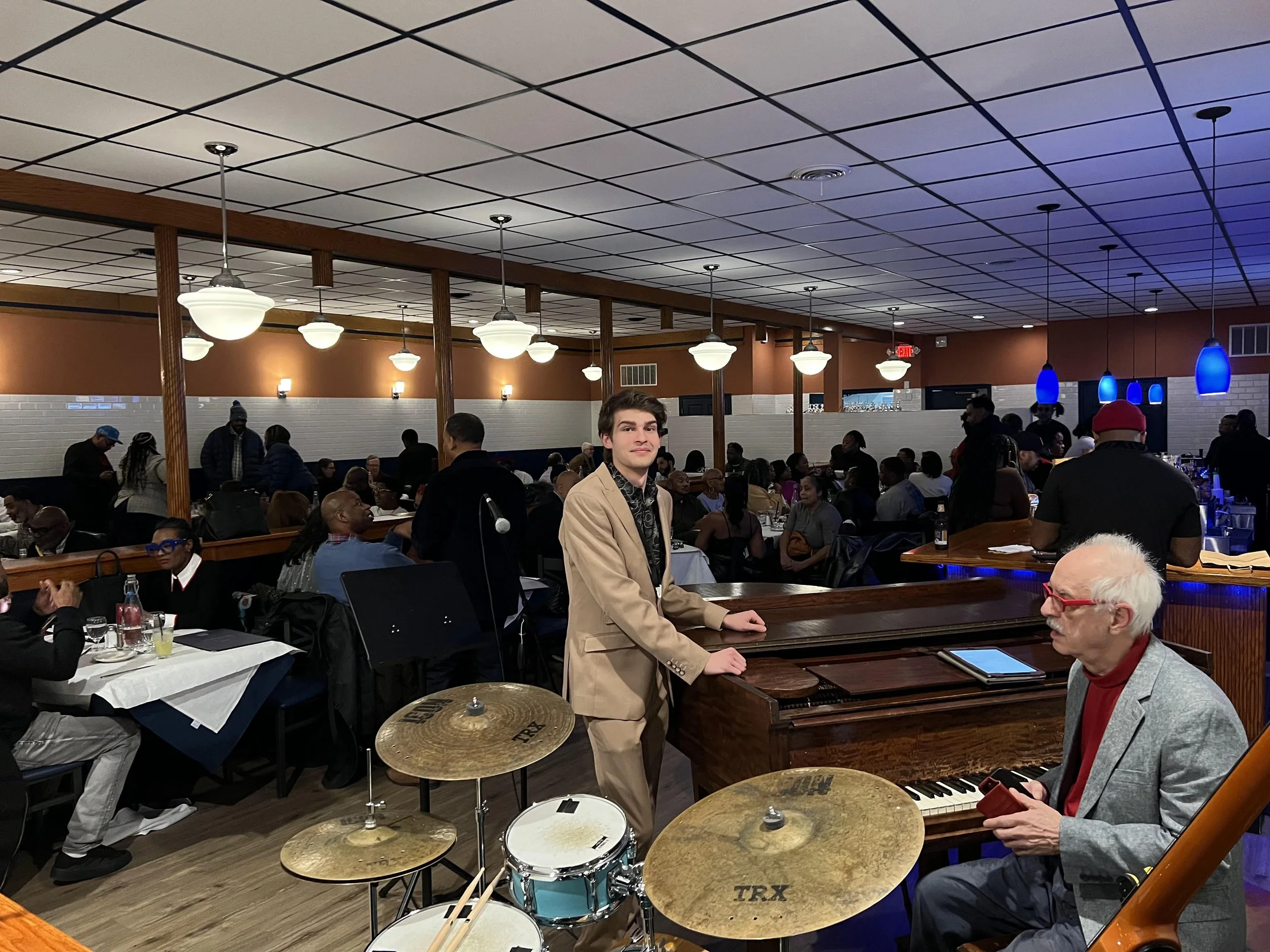Sax player performs jazzy tunes
Musician Nate Topolewski plays the sax. Photo by Jeff Dunn
By Tom Victoria
Nate Topolewski’s music is all that jazz. The singer and saxophone player carries on a storied musical tradition.
“I'm mostly playing jazz and funk, some Motown and R&B, and soul in there, too,” he said. “I play at a lot of Detroit-based clubs. I don't know if you've heard of Cliff Bells. It's the oldest jazz club in the world.”
Nate, 19, who performs under the abbreviated surname Topo, said music is a way for him to impact others.
“It definitely is a way for me to express myself in ways that I couldn't in words, but it's also an opportunity to make other people feel something,” he said. “If you're vulnerable to an audience, they're going to feel the same way. I think of it as even though you're up on stage talking down to people, it seems like there would be a disconnect there. But in my experience, there really isn't. It's almost like a conversation between you and this group of people, and they're all feeding off of how you're feeling. So I think that's really special. If I can make people feel happy or sad or vulnerable or all of those emotions together, that's what I'm passionate about doing.”
Nate, who also has a band, The 313 Group, performs day and night.
“Retirement communities are making me a good chunk of change,” he said. “I'm traveling around and playing piano and singing tunes for seniors by day, and then I'm playing at night. And right now, that's enough. I just finished recording my album, so I'm hoping that propels me a little bit, too, on the album.”
Nate sings as well as plays sax and piano on the album.
“It's got all my stuff in it,” he said. “And I have a lot of very special guests on there, too. A lot of Detroit stars. Gayelynn McKinney plays drums on that. She was the last drummer for Aretha Franklin before she passed. On bass is Ralphe Armstrong. He's probably gotten around more than any musician I've ever heard of. He played with everybody from Miles Davis to Santana, Jeff Beck.”
Nate’s been playing before audiences since his second year of high school.
“We've got some great clubs, some very high class clubs,” he said. “One of them is called Bert's. That's where I kind of got my start. That was in my sophomore year of high school. At that time, I had just got a job at this little bar called Boodles restaurant. I was just playing piano there. That's when I was sort of figuring out that you could actually make money doing music. It was more than just a band in high school that you could join. I discovered Bert's when I went to this music store. It's called Detroit Saxophone Center. And I met Rick Pioch. He showed me all of these vintage saxophones. It was just very intriguing to me. He told me that there was this place called Bert's, and it was an open mic every Thursday, so you could just go and hang out and play a couple tunes and get a feel for everything. So my dad and I went down there with him. I think it was the same night, and it just blew my mind.”
Nate was exposed to classic jazz.
“It was where all of the old Motown artists went to hang out,” he said. “I mean, The Spinners were in there, Martha Reeves was in there, James Carter — he's probably the best saxophonist in the world. They were all just there playing in front of me, and they invited me up with them. I never even played saxophone in public before. So that was the experience that really changed me, started making me think and got me passionate about doing it. That's the beautiful thing about Detroit is that we have so many mentors like that who are just hanging around, and they're completely open to embracing you and taking people in they don't even know. They just want to make sure that the legacy of their music continues.”
Nate performs every week, which enables him to offer young talent the same opportunity given to him.
“Right now, I'm playing quite a lot,” he said. “I used to go to Bert's every single Thursday and not get paid for it, just for the love of being there. And then I actually started running Fridays at Bert's for about a year-and-a-half. I did every Friday at Bert's with my own band. And now, we've kind of shifted over to their family. The Bert's family has this new restaurant that's more upper class, and it's called the Savoy Detroit. I'm there now every Saturday and Sunday, and I'm trying to continue that line of inviting new people in that maybe haven't gotten a chance to play before. I'm there every Saturday and Sunday. I'm also at a place called Tony V's every Friday, and I'm doing the same thing. I'm inviting a lot of the Bert's personnel over there. My goal is to just expand the reach of this music in the city and give young artists an opportunity to play with us.”
Nate also instructs young musicians off the stage.
“I teach part-time right now,” he said. “My main focus is writing and performing, but teaching is still a rewarding experience for me. It feels good to help ensure a future generation of musicians in this genre.”
Photo by Jeff Dunn
Nate explained how playing a saxophone is an adjustment.
“I've been playing every day for four years at this point,” he said. “So it's pretty easy for me now to play a three-hour gig without any problems in my face and my throat. But it is interesting, sonically, just how you're playing into the instrument and there's vibrations happening all throughout your sinuses and your head. If you have a headache already or if you're sick, it definitely has an impact on you and it's hard to get through it. But there have been strange nights for me where I'm really digging in and blowing hard. There's this one night that kind of startled me while I was playing. I was exhaling so hard that air was starting to get sucked in through my nostrils while I was blowing out through my mouth. It was this weird circular breathing effect, but I didn't even mean to do it. Strange things happen when you really dig in.”
Nate said holding the saxophone can be awkward at first.
“You're holding a 6- to 12-pound hunk of metal, and that can be very clumsy for people, especially if it's dangling around your neck,” he said. “I first had to figure that out. The more lengthy and challenging part is your ambusher, which I'm referring to the structure of your mouth and your tongue while you're playing. That was very challenging for me and a lot of my students and other people to stay relaxed and not bite on the mouthpiece and be tight. You want everything to be relaxed and kind of just set into place. That definitely took a few years to get right.”
Nate also plays piano, letting his emotions inspire him.
“Most of the time, I'd probably just sit down at the piano and write a tune about it,” he said.
For Nate, each instrument has its own role.
“The piano is good because it's a chordal instrument,” he said. “So for me, that's more of an at-home thing where I can sit with stuff and let things stew and write ideas down using the piano. But the saxophone is nice to play with professionally because it's kind of the closest thing to a human voice. A lot of times, it's easier to connect people with that. You're also upright and walking around with it. You're more mobile than being at the piano. I like that better about it.”
Photo by Jeff Dunn
Nate enjoys playing others’ works as much as his own.
“There's so many great songs that have been written that I've yet to learn,” he said. “I would say I'm a pretty prolific writer, but I enjoy playing other people's music just as much.”
Music has inspired Nate since he was a tyke.
“I was thankful to grow up in a house that already had a piano in it,” he said. “So some of my earliest memories from ages 3 and 4 are playing the piano along to Billy Joel. My parents would just put songs on and I would play to it. At first, it was probably really bad. Eventually, I started figuring out what keys did what and figuring out what the right notes were. It's always been a part of my life.”
Nate didn’t realize it yet, but he was into jazz.
“The first big impact was my teacher Dominic (Bierenga),” he said. “He's been my teacher for eight years now. Sixth grade is when I picked up the saxophone and stopped just playing piano. And I kind of came into his room and I showed him. I'm like, these are all the songs I wrote. These are all my ideas. For two years, he kept telling me over and over again, these progressions are called jazz. You're coming up with these chords that are very similar to jazz chords. You should check out this genre. As a sixth-grader I was like, I've never heard of jazz before. I listen to what my parents listen to and that's rock and pop. My parents exposed me to a lot of genres, but it was mostly rock. I was just like, no, I don't like jazz. Why would you say that? And then after two years of him telling me that, I finally started exploring jazz tunes on YouTube and I was like, oh my god, he was right.”
Nate credits his circumstance for guiding him to his passion.
“It was always in me,” he said. “There was definitely always that ember inside of me. But it's just a series of fortunate events that happened to me. I got lucky. I happened to be born in a house that already had a piano and I happened to get a teacher who really cared about me and who was interested in jazz. It all just kind of worked out.”
Nate attended one semester of college before deciding that wasn’t his path.
“Wasn't for me,” he said. “I sat in lecture halls and three-hour classes, and I'd find myself arranging a tune or looking at clubs in other cities and planning a tour for the summer, doing things that were not related to calculus.”
Nate knew a 9-to-5-job wasn’t in the cards.
“I hated high school for a lot of reasons, and that was definitely one of them,” he said. “The structured block of your day, it got to me a little bit. I'm not saying it's bad to have structure. I have a schedule, but I'm one of those people who needs to make my own schedule.”
Nate doesn’t play on just any random saxophone.
“I'm not just playing any old instrument,” he said. “My first horn I purchased from my friend Rick was from 1923. The one I have now is from 1919. Those two were tenors. I also have a soprano now. That's from 1906. It's the same as a choir. You have your sopranos, altos, tenors, baritones. I love the story that's behind them. I love the way they play. We always say around here, you can't beat that metal because you can't. It was mined here. It was mined in Elkhart, Indiana. You can just tell if you hold a modern instrument and one of these vintage ones next to each other, you can just feel the difference. I love the sound. I love how they project. The sound is just like butter. It's so smooth and easy to play on, and it makes it easier for me to express myself.”
The instruments require minimal maintenance.
“There's a piece of leather that seals the key to the body of the saxophone,” Nate said. “Those definitely don't last forever. They've been replaced at least twice on my horns now, because obviously you're blowing into it, so there's condensation. A lot of people eat right before they play. I don't do that. It's not very good, but the food will destroy the pads. Underneath that pad is just a little bit of cardboard that the pad is stitched to. So if there's a micro leak in that leather, the whole thing gets ruined on the inside, and you got to dig the whole thing out and replace it. But in terms of the actual structure of the instrument, it's solid brass, so it can definitely last a few more hundred years.”
As with many people in the arts, Nate isn’t restricted to one discipline.
“I'll act,” he said. “I was in a couple of plays. I'll do that, too.”
Nate has another passion: scaly critters.
“I'm interested in reptiles, too,” he said. “I'm breeding some things on the side, like dart frogs and fish and such. But that definitely seems like more of a hobby right now. A hobby where I can sell some things and break even on it.”
Nate houses other creatures that would creep out some people.
“I've got tons of roaches,” he said. “The animals got to eat, and you can't spend one dollar a dozen on roaches every couple of days.”
Nate has a reptile collection. Photo submitted
Nate’s family doesn’t complain about sharing their domicile with reptiles and insects.
“My mom is cool with it,” he said. “She doesn't like the mammals, so I can't have mice or rats or guinea pigs or anything, but the reptiles — for whatever reason — she's cooler with that than any mammal. I've got a pretty extensive collection. And I've got some weird stuff like mud skippers. I have dart frogs, I have these bright purple toads from Suriname. I'm one of only probably a dozen people in the country to have them right now. Chameleons that have horns coming out of their head. They look like unicorns, things that look like triceratops. A lot of interesting, cool things keeping me going.”
Traipsing around outside led a younger Nate to an interest in reptiles.
“Just exploring the woods as a kid,” he said. “I would catch frogs and snakes and turtles. That's what was around. I didn't catch birds or mammals, it was lizards and stuff. I brought home a frog that I found in the woods, which is really bad to do. But I was like 7 years old. And since then, I became really passionate about making the habitats and designing the little worlds for them.”
Nate never lost interest in the hobby.
“And now, 10, 11 years later, I've perfected my process a lot,” he said. “I'm actually building enclosures from scratch, from wood, completely custom. I epoxy the inside. I make the backgrounds myself with foam and Drylok, and I carve rock out and use real branches. And then I mix soil together. That's bioactive, they call it. It has worms in it and roly-polys and things breaking down feces. It makes it more like a natural environment or an ecosystem in that there's an actual cycle and exchange of waste inside of the enclosure. Everything's real. Real plants and real microbes breaking down feces. It's pretty interesting. A lot of the enclosures are almost self-sustaining because I've released roly-polys. I've released crickets and cockroaches. Some of them are so big, they're 4- or 5-foot long, where the crickets and little critters have places to go and hide and reproduce. The lizards that are living in there can't pick them all off at the same time. I've gotten to design all this, and then I've sat back and watched them just subsist off of the colonies that are growing in there. It seems like it's reflective of the human experience, where it's: let's make something as close to an ecosystem as possible. Even though it's completely artificial, it just amazes me.”
Nate doesn’t have other hobbies.
“This is my hobby,” he said. “I'm making my hobby my career. I dropped out of school to do what I was doing in my free time, and I'm much happier for it. This is all I want to do. I'm just writing songs, playing with reptiles.”
Nate uses social media to get the word out about his music.
“It's a good way to connect with people,” he said. “Where I am right now, it's definitely strange to me. I feel like an old man in the sense of I don't really know how to figure any of it out or how the algorithm works. I'm posting where I'm playing in a video every so often. But, yeah, there's so much potential to it. I'm going to keep digging into that and learning about it.”
Nate stays motivated through reflection.
“The main thing for me is when I sit down and remember what I went through to get through this point,” he said. “I faced a lot of challenges to be able to do what I'm doing now. And the fact that I made it through high school and I dropped out of college, I decided that wasn't where I wanted to be. That's a big motivation for me to realize that you have wanted to play music your entire life. And now, I actually get to do that. I get to be free and just be creative every day. That's a big part of what keeps me going.”
Nate said his locale is a boon.
I'm also very lucky to be in Detroit, where there's so many mentors here, just on the streets who are ready to embrace you,” he said. “People who toured with The Spinners and The Temptations, they're still here. They're hanging out here. Even Stevie Wonder's here hanging around. I'm only one person away from hanging out with Stevie. Everybody knows each other. Everybody's willing to share their experience with you. So if you're having a bad day, I've got two dozen people I can call and they can give me a pep talk. So that's a really good thing to have.”
Nate dispensed advice for aspiring musicians.
“Whether you just want to perform in public or whether you want to do it as a career, you got to have a thick skin,” he said. “I was once told no matter what room you're in, one-third of the people are going to love you, one-third of the people are going to hate you and one-third isn't going to care. You should be shooting for the one-third that doesn't care and try to inspire them. But stuff is going to happen if you're out in the world making music and you got to just have a thick skin, because if you don't, you're going to get eaten alive. This business is not kind to people.”
Nate added another suggestion.
“The other thing I would say is just be an individual. Emphasize your individuality, play for yourself, be vulnerable. And if you just play the music that you want to play and play it how you want to play it, people are going to recognize that and you're going to be successful.”
Nate’s website: https://www.natetopo.com/
Nate’s Instagram: https://www.instagram.com/nate_topo/


